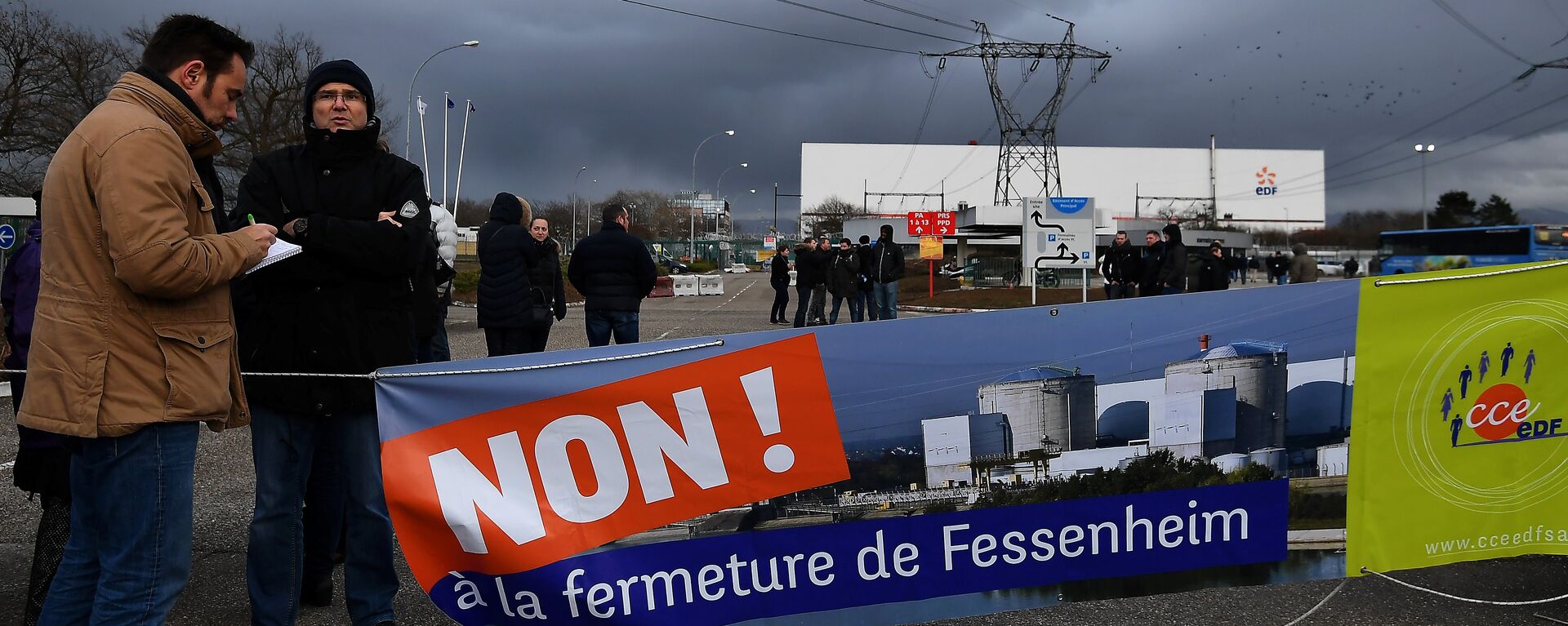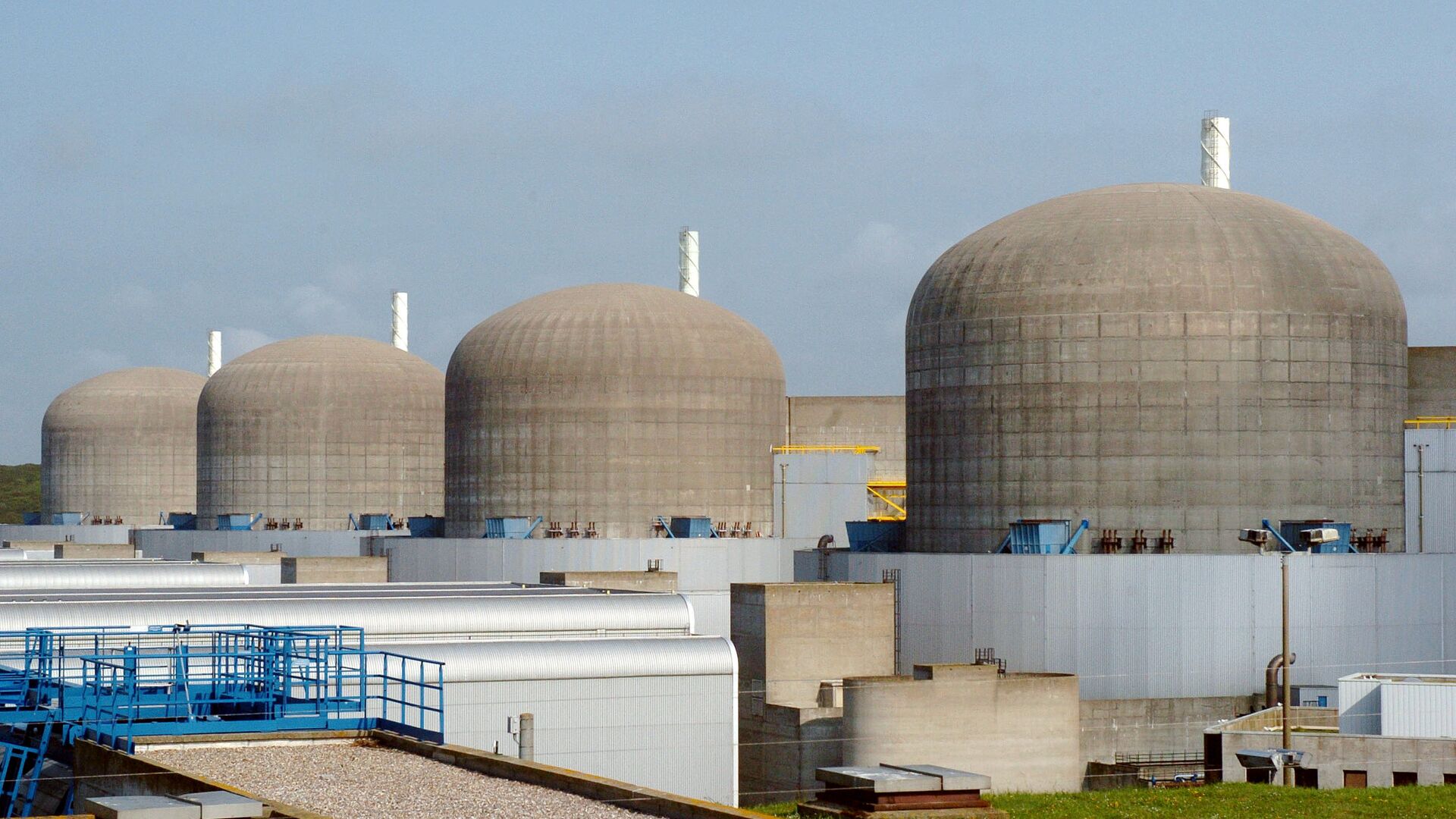https://sputnikglobe.com/20211012/macron-touts-bigger-investment-in-nuclear-energy-despite-frances-plans-to-reduce-share-by-2035-1089867384.html
Macron Touts Bigger Investment in Nuclear Energy Despite France's Plans to Reduce Share by 2035
Macron Touts Bigger Investment in Nuclear Energy Despite France's Plans to Reduce Share by 2035
Sputnik International
Macron Touts Bigger Investment in Nuclear Energy Despite France's Plans to Reduce Its Share by 2035
2021-10-12T15:48+0000
2021-10-12T15:48+0000
2023-07-31T16:57+0000
france
europe
nuclear power plant
https://cdn1.img.sputnikglobe.com/img/102415/19/1024151931_0:124:2464:1510_1920x0_80_0_0_2035c2fffc3fecb875b123963776d461.jpg
French President Emmanuel Macron has announced that his government has plans to invest as much as 1 billion euros ($1.15 billion) in the country's nuclear power development. He added that investing should start "very quickly".The small-scale nuclear reactors Macron mentioned are easier to produce for domestic use and can give France a competitive edge on the global market as well.Historically, France has been ahead of all European states on investmenting in nuclear energy and 75 percent of the energy it produces is done via nuclear power plants. France has been focusing on developing nuclear energy generation since 1974, when the world witnessed global oil shocks and rocketing fuel prices.The shift in policy only occurred in 2011 after the disaster at Japan's Fukushima nuclear power plant, when a tsunami caused an outage and subsequent uncontrolled leak of radioactive waste into nearby waters and land. France adopted a plan to reduce the share of nuclear energy to 50 percent by 2025, later shifting the deadline to 2035.This plan put a cap on the maximum accumulated amount of power produced at power plants. However, it did not prohibit the country from building new plants to replace the ageing ones. It is unclear at this moment, whether the new investment policy declared by Macron involves upgrades to the country's present nuclear power capacities, or a reversal of the 2011 policy with a subsequent increase in nuclear power generation in France.The new nuclear power investment plan has also notably arrived as gas prices in Europe continue to rocket, driving concerns about the lack of fuel and soaring energy prices for consumers and businesses alike. The global deficit of energy resources, reduction in supplies from Russia of liquified natural gas, along with decades-low levels of gas reserves in the EU has caused the price to jump from around $700 to more than $1900 per thousand cubic metres.
https://sputnikglobe.com/20180120/france-nuclear-plant-closure-1060912031.html
france
Sputnik International
feedback@sputniknews.com
+74956456601
MIA „Rosiya Segodnya“
2021
Tim Korso
https://cdn1.img.sputnikglobe.com/img/07e6/03/0d/1093831826_0:0:216:216_100x100_80_0_0_e3f43a960af0c6c99f7eb8ccbf5f812c.jpg
Tim Korso
https://cdn1.img.sputnikglobe.com/img/07e6/03/0d/1093831826_0:0:216:216_100x100_80_0_0_e3f43a960af0c6c99f7eb8ccbf5f812c.jpg
News
en_EN
Sputnik International
feedback@sputniknews.com
+74956456601
MIA „Rosiya Segodnya“
Sputnik International
feedback@sputniknews.com
+74956456601
MIA „Rosiya Segodnya“
Tim Korso
https://cdn1.img.sputnikglobe.com/img/07e6/03/0d/1093831826_0:0:216:216_100x100_80_0_0_e3f43a960af0c6c99f7eb8ccbf5f812c.jpg
france, europe, nuclear power plant
france, europe, nuclear power plant
Macron Touts Bigger Investment in Nuclear Energy Despite France's Plans to Reduce Share by 2035
15:48 GMT 12.10.2021 (Updated: 16:57 GMT 31.07.2023) Although France has long remained a European champion of nuclear energy, it changed its course after the 2011 disaster at Japan's Fukushima plant. Since then, Paris has been planning to reduce nuclear energy's share in the country's overall electricity generation from 75 percent to 50 percent.
French President Emmanuel Macron has announced that his government has plans to invest as much as 1 billion euros ($1.15 billion) in the
country's nuclear power development. He added that investing should start "very quickly".
"We will continue to need this technology […] The number one objective is to have innovative small-scale nuclear reactors in France by 2030 along with better waste management."
The small-scale nuclear reactors Macron mentioned are easier to produce for domestic use and can give France a competitive edge
on the global market as well.
Historically, France has been ahead of all European states on investmenting in nuclear energy and 75 percent of the energy it produces is done via nuclear power plants. France has been focusing on developing nuclear energy generation since 1974, when the world witnessed global oil shocks and rocketing fuel prices.
The shift in policy only occurred in 2011 after the disaster at Japan's Fukushima nuclear power plant, when a tsunami caused an outage and subsequent uncontrolled leak of radioactive waste into nearby waters and land. France adopted a plan to reduce the share of nuclear energy to 50 percent by 2025, later shifting the deadline to 2035.

20 January 2018, 08:32 GMT
This plan put a cap on the maximum accumulated amount of power produced at power plants. However, it did not prohibit the country from building new plants to replace the ageing ones. It is unclear at this moment, whether the new investment policy declared by Macron involves upgrades to the country's present nuclear power capacities, or a reversal of the 2011 policy with a subsequent increase in nuclear power generation in France.
The new nuclear power investment plan has also notably arrived as gas prices in Europe continue to rocket, driving concerns about the lack of fuel and soaring energy prices for consumers and businesses alike. The global deficit of energy resources, reduction in supplies from Russia of liquified natural gas, along with decades-low levels of gas reserves in the EU has caused the price to jump from around $700 to more than $1900 per thousand cubic metres.





